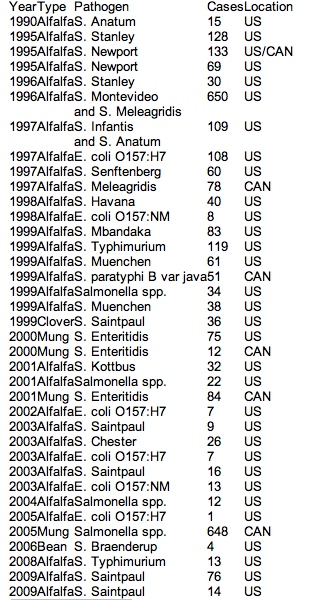
I don’t like sprouts. Never have. When I inadvertently eat them (like when someone sneaks them into my sandwich, often at a food safety conference) I find myself picking them out of .jpg) my teeth.
my teeth.
But lots of people do. And that’s fine. Consumption of sprouted seeds and beans has become increasingly popular in North America and other parts of the world, consistent with an increase in consumption of fresh fruits and vegetables as recommended by health authorities. Nutritious and yummy to some, sprouts are popular options for vegetarians and those trying to increase their vegetable intake.
That’s what I wrote in November, 2005, as Ontario, Canada was in the midst of a Salmonella outbreak in mung-bean sprouts which would eventually sicken at least 650 people.
Wow.
As news spreads of the latest sprout-related outbreak, I revisited Ontario once again for a huge, tragic and unnecessary outbreak, like Walkerton.
In Jan. 2002, the U.S. Centers for Disease Control and Prevention issued ?a renewed call for Americans to avoid fresh alfalfa or other sprouts, and that people, particularly young children, the elderly and those with weak immune systems, should avoid eating raw sprouts.? Dr. Mark Beatty of the CDC’s National Center for Infectious Diseases, was quoted as saying in 2002 that,
"The immunocompromised people could develop shock and die from the infection," although healthy people were at a lower risk for such complications.”
Beatty was further quoted as saying that a 2001 outbreak in four western states revealed a "misconception" that sprouts were a healthy food. At least three of the people involved in the outbreak ate sprouts partly for health reasons.
Because of continued outbreaks, the sprout industry, regulatory agencies, and the academic community pooled their efforts in the late 1990s to improve the safety of the product, including the implementation of good manufacturing practices, establishing guidelines for safe sprout production and chemical disinfection of seeds prior to sprouting.
?.jpg) The first consumer warning about sprouts was issued by the U.S. Centers for Disease Control (CDC) in 1997, By July 9, 1999, FDA had advised all Americans to be aware of the risks associated with eating raw sprouts. Consumers were informed that the best way to control the risk was to not eat raw sprouts. The FDA stated that it would monitor the situation and take any further actions required to protect consumers.? At the time, several Canadian media accounts depicted the U.S. response as panic, quoting Health Canada officials as saying perhaps some were at risk, but that sprouts were generally a low-risk product. ?
The first consumer warning about sprouts was issued by the U.S. Centers for Disease Control (CDC) in 1997, By July 9, 1999, FDA had advised all Americans to be aware of the risks associated with eating raw sprouts. Consumers were informed that the best way to control the risk was to not eat raw sprouts. The FDA stated that it would monitor the situation and take any further actions required to protect consumers.? At the time, several Canadian media accounts depicted the U.S. response as panic, quoting Health Canada officials as saying perhaps some were at risk, but that sprouts were generally a low-risk product. ?
Tell that to the 650 sick Ontarians.
We count 38 sprout-related outbreaks since 1990, in North America alone.
And there’s a couple missing from this list. But you get the idea. The table is also available at:
http://bites.ksu.edu/sprout-associated-outbreaks-north-america-1990-2009

